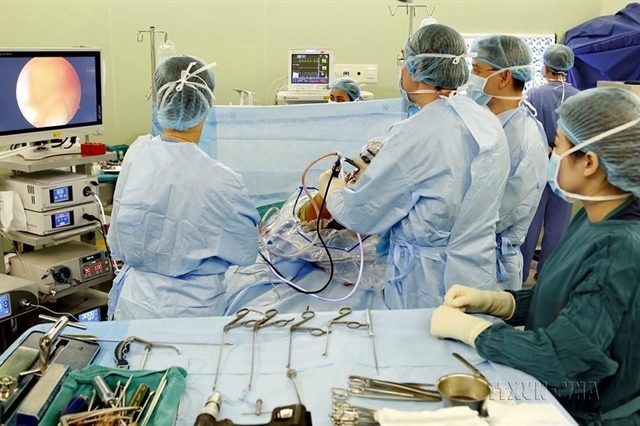 Society
Society


|
| Doctors perform a surgery at the Orthopedic and Spine Department of Bạch Mai Hospital in Hà Nội. —VNA/VNS Photo Dương Ngọc |
HÀ NỘI — As the amended Law on Medical Examination and Treatment will officially take effect from January 1 next year, experts are urging authorities to issue detailed guidelines for the law.
This was one of the topics discussed during a talk named Ngành Y vượt khó (Health sector overcomes challenges) held yesterday by the Government News Portal.
Dr Trần Bình Giang, director of Việt Đức (Việt Nam - Germany) Friendship Hospital, said that according to the drafting committee and the National Assembly (NA), the amendment is intended to be open and for long-term applicability.
This is why multiple clauses in the document state that “the Government shall issue detailed regulations on the implementation of this clause,” which means specific documents under the law are needed for enactment, he said.
Director of Bạch Mai Hospital Dr Đào Xuân Cơ also shared the same point of view, adding that the revised law has made significant progress by having an entire chapter on the financial framework of hospitals, addressing a major bottleneck in the sector’s operations.
Việt Đức and Bạch Mai are among the country’s large hospitals that will see a considerable impact as the law and policies change.
Meanwhile, many of these medical facilities are witnessing a ‘brain drain’ due to decreasing income.
Bạch Mai Hospital has to resort to loans from the development fund for regular expenditures for their doctors and staff.
Dr Cơ said: “We are quite worried that when the base salary [for public sector workers] rises on July 1, our hospital’s resources for recurrent expenditures would not be enough to pay all of our employees. The matter has also been reported to the health ministry.”
Dr Bùi Sỹ Lợi, former vice chairman of the NA Committee for Social Affairs, agreed that as the base salary ranges change, adjustments need to be made immediately to the pricing of the services in order to ensure sufficient income.
He added: “We did not have correct and sufficient calculations, that’s why medical facilities are reporting decreasing income and difficulties in paying their staff.
“The government and the NA need to have discussions to address this issue for the sake of civil servants and public employees."
Meanwhile, the COVID-19 pandemic, as well as difficulties in the procurement process of medications and equipment, have been putting a strain on the healthcare sector.
Working to address these problems, the health ministry has been focusing on the NA’s Resolutions 80 and 98, which were issued to extend drug registration and manage medical equipment, respectively.
Deputy health minister Đỗ Xuân Tuyên said: “The ministry has also issued nearly 50 circulars to guide the adjustment of regulations related to drug and equipment procurement to ensure these supplies.”
Occupational allowances for medical staff at the grassroots level and for preventive medicine have also been proposed to increase from 40-70 per cent to 100 per cent. The allowance is calculated based on their salary.
The health ministry is also working with the national health insurance agency on the payment of medical examination and treatment costs.
It is expected that the payment to medical facilities across the country for the 2018-21 period will total VNĐ7 trillion (US$294 million).
Tuyên said: “I believe that this will be a great resource for health facilities to restructure the supply chain of drugs and medical equipment, as well as ensuring the recurrent expenditures to maintain their operations.” — VNS




